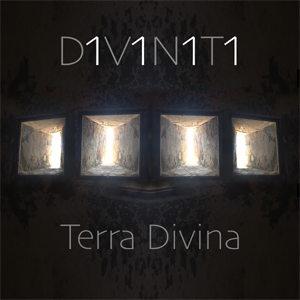 I’ve encountered several collaborations between Canadian musician Tim Clément and other artists — readers here may remember Wolfsong Night, in which Clément and guitarist Kim Deschamps delivered a complex and multi-facted album that stands up under repeated listenings. Clément’s latest effort is a collaboration with Ben Watson; calling themselves D1V1N1T1, the two have created Terra Divina, which they describe as “a balanced exploration of what the external world offers our soul and the introspective space of our individual acquiescence.”
I’ve encountered several collaborations between Canadian musician Tim Clément and other artists — readers here may remember Wolfsong Night, in which Clément and guitarist Kim Deschamps delivered a complex and multi-facted album that stands up under repeated listenings. Clément’s latest effort is a collaboration with Ben Watson; calling themselves D1V1N1T1, the two have created Terra Divina, which they describe as “a balanced exploration of what the external world offers our soul and the introspective space of our individual acquiescence.”
Given that, one’s first impulse is to say, “Oh, New Age” and continue on one’s way. Don’t be so hasty. “New Age” in music is one of those terms like “photography” or “psychology” that covers a lot of territory, from “space music” through trance to some pretty tough experimental works on the order of Robert Rich’s “sleep concerts”, music based on the circadian rhythms of the human body. So we’re talking about a wide range of possibilities here. (This impatience with genre boundaries is not something that’s been limited to music — literature, especially that area known as “speculative fiction”, has given rise to hybrids and new forms known as “interfictions” or “slipstream”. Same impulse — just create the work and let the critics worry about classifications.)
OK, now that that’s out of the way, to the music, which was created from field recordings of instruments of various cultures, aboriginal voices, and spoken word worked into electronic performances by Clément and Watson.
This album is, to say the least, wide-ranging, from the opening (“Garden of Dreams”) which begins with what sounds like children playing, a short sequence that is soon overtaken by a low-key orchestral passage with subtle, almost indecipherable vocals. This early on, the various sources make themselves apparent, sometimes subtly, sometimes not so much — there’s a definite jazz feel to sections of this piece. This leads almost undectably into “Tau Ceti”, another slow-paced work, again with those almost subliminal vocals, underscored by a catchy syncopated rhythm.
Lest you think we’re heading down the “transcendental meditation” path, things change. “Konkacheli (Grandfather)” is a spoken recitative on the fate, or condition, of America — among other things, including the make-up of the human body and evolution — underlain by an electronic accompaniment interspersed with a wordless female vocal. It’s a sharp jump in mood from the previous tracks, and generates a unique kind of tension.
“Foolish Angels” is an upbeat selection that, after an ethereal, almost formless introduction, develops a strong jazz feel to it, both in the trumpet and the female vocals — and note that, in spite of Clément’s fondness for spoken word, in this instance, as is often the case on this album, the voices are treated as instruments, wordless, blending in smoothly with the other instruments, developing a momentum that leads to a finish as ethereal as be beginning.
“Mintaka the Beautiful” starts off almost as a continuation of that ethereal feeling, which soon gives way to another one of those syncopated rhythms, somewhat Middle Eastern in feel, as is the vocal, which makes full use of the range of ornamentation in the singing of North Africa and the Middle East. I’m reminded of some of the music I’ve encountered in the past, music from medieval Iberia and North Africa, even what I dubbed “Middle Eastern Pop”. It’s a lot of fun. (Don’t take that wrong — art is supposed to be enjoyable.)
“Heart of Rosette . . . Tempus Divina” gives pride of place to the non-electronic components, with again a Middle Eastern-sounding instrumental under a vocal line that is almost a chant — which all segues smoothly into an arrangement of chords over an occasional spoken-word vocal, which eventually fades into the distance.
These are just a few tracks from what is a collection of very rich, complex and seductive music — frankly, in trying to describe it, words come very near to being inadequate (not that such attempts are easy to begin with). Let it suffice to say that every time I listen to the album, I find something new. In my experience, that’s a characteristic of any music — or any art, for that matter — worth attention.
Trumpets provided by Wally Jericho.
(Self-distributed, 2019)
